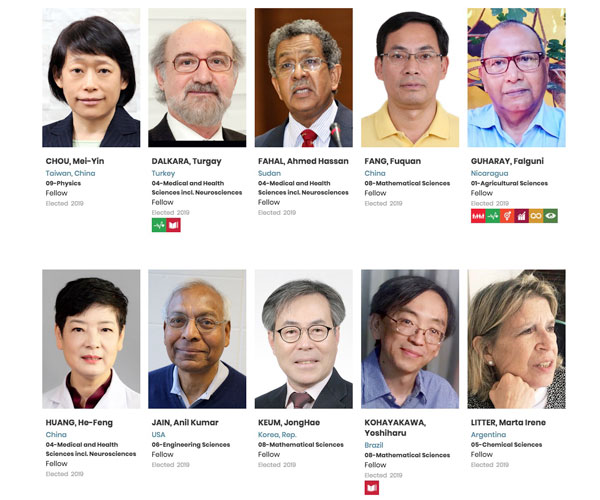 The interactive TWAS Online Directory now includes the latest scientists to join the TWAS community, including researchers who have achieved elite status working in some of the world's least developed countries.
The interactive TWAS Online Directory now includes the latest scientists to join the TWAS community, including researchers who have achieved elite status working in some of the world's least developed countries.
In all, 46 new scientists were elected as lifetime TWAS Fellows in the class of 2019. Twenty-five Young Affiliates – scientists aged 40 and under – were selected for five-year terms. Most come from developing countries; some among them are the first TWAS Fellows in their countries.
TWAS Fellows who are the first in their countries include Bolivian ecologist Monica Moraes; agriculture expert Bounthong Bouahom and chemist Boviengkham Vongdara, Minister of Science and Technology, both from Lao People's Democratic Republic; engineer Naeem Mohamed Abdurrahman, formerly Libyan Minister of Higher Education and Scientific Research; Nicaraguan cocoa expert Falguni Guharay; and chemist Stephen Simukanga from Zambia.
Visit the TWAS Online Directory to see the strength of the Academy's global scientific networks.
In addition, the Directory includes four new members have been elected from under-represented countries in TWAS's membership. They are chemistry professor Emad Yousif Al-Sarraj from Iraq; professor of surgery Ahmed Hassan Fahal from Sudan; Turkish neurologist and psychiatrist Turgay Dalkara; and theoretical astrophysics Bobomurat Ahmedov, from Uzbekistan.
Young Affiliates have their own section in the TWAS Online Directory. They are nominated every year by the Academy's Regional Partners, and are among the best scientific researchers aged 40 and under in the developing world.
These and the other new additions to the TWAS community represent a remarkable milestone reflecting the Academy's efforts to broaden its influence among the world's science- and technology-lagging countries, as well as its commitment to networking the scientific community from the Global South.
The TWAS Online Directory was launched in 2018, with powerful search tools and infographics to make it a useful resource for scientists, policymakers, journalists and others. It features a contemporary, engaging design, and it's search functions can sort the scientists by country, year of election, field of research and other parametres. Members' entries also can note how their work supports the UN Sustainable Development Goals.
Cristina Serra

